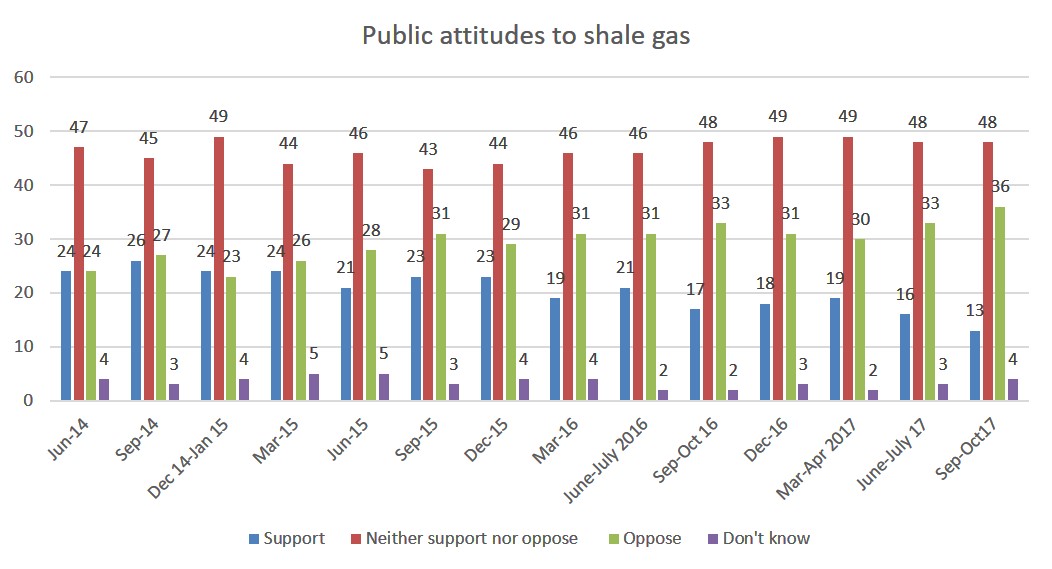
The latest findings from the government survey of attitudes to fracking in the UK shows dwindling support for the second quarter running.
The results, published this morning, has support (rounded figure) at 13%, the lowest level since the question was first asked. This is more than 3 points down on the previous low of 16% in the survey carried out in the summer of this year.
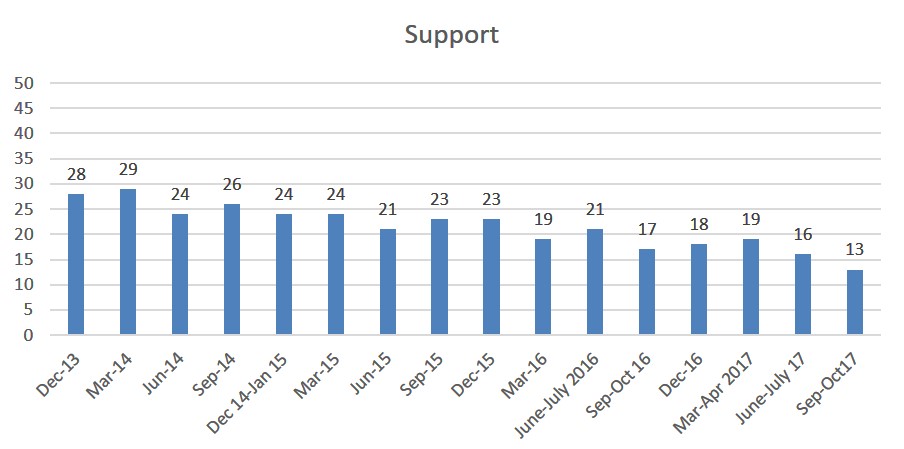
Opposition to fracking was at record levels of 36%, (rounded figure) up from the previous high of 33%.
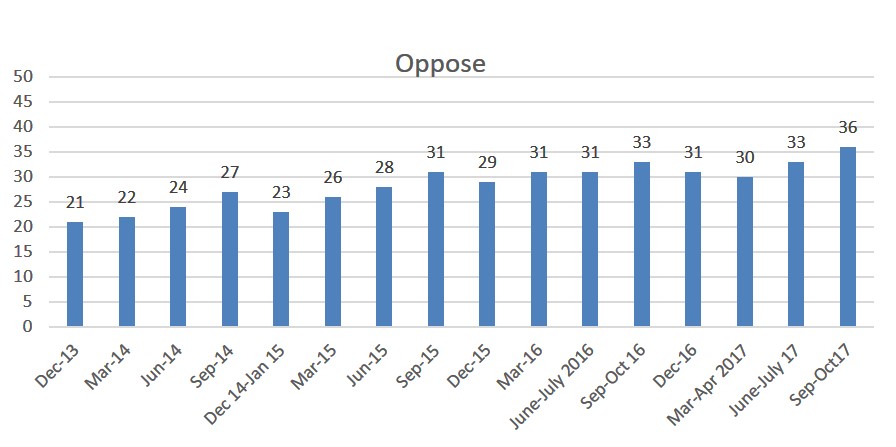
The gap between opposition and support is again the largest so far recorded, increased from 17%, in the previous survey.
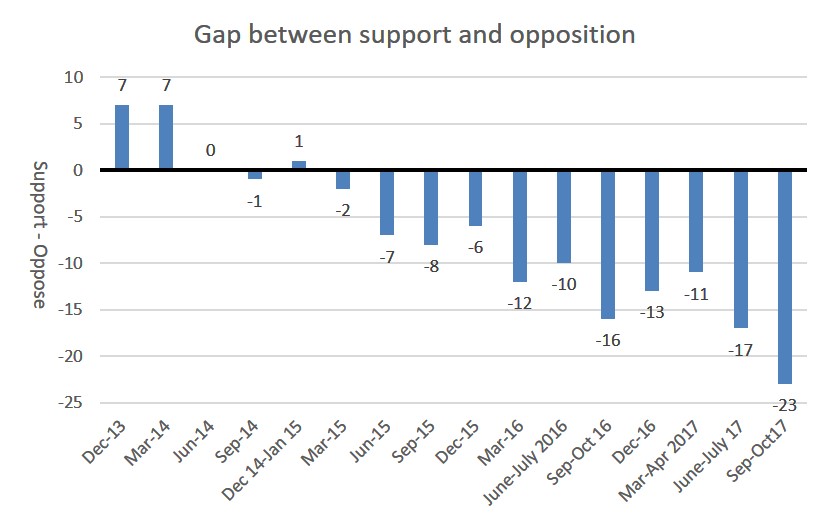
The survey was carried out in September and October 2017, after Third Energy started work at its fracking site at Kirby Misperton in North Yorkshire.
Reaction
Elisabeth Whitebread, energy campaigner at Greenpeace UK, said:
“The government is blocking its ears to the rising voices asking them to stop backing fracking, but ordinary people are making that increasingly difficult. The Conservative manifesto said fracking would only continue with public support, but their own opinion polls show support for fracking is at a record-low, with nearly three times as many people opposing it as supporting it.
“With fracking now banned or blocked in Northern Ireland, Scotland and Wales, the Westminster government is isolated. Their own plans show that fracked gas is an irrelevance for UK energy security. Greenpeace is standing with all the brave and dedicated local people who will continue to protest peacefully until ministers realise they would do better to ditch fracking and focus on clean, affordable and popular offshore wind, solar and tidal power instead.”
Rose Dickinson, Friends of the Earth campaigner, said:
“Again, the government has asked the public what they think, and again, they don’t want fracking – the tiny support fracking does have is now at a record low. This survey comes at a critical time because the Secretary of State, Greg Clark, is deciding if he should grant the final permission to frack in England.
“Now, as Mr Clark considers that decision in light of the highest recorded levels of public opposition, he can still decide to stop fracking.”
Ken Cronin, Chief Executive of UK Onshore Oil and Gas, said:
“The stats clearly show that the majority of people in the UK are in the ‘don’t know’ category, or undecided on the process. This is why it is more important than ever to continue our work with local communities to dispel the myths being promulgated by our opponents. The need for a homegrown source of gas to reduce our import dependency both on economic and environmental grounds should be the clear focus of the UK’s attention.”
Strong support and opposition
According to the survey, strong support for fracking has fallen to 1%, down from 2% in the previous survey.
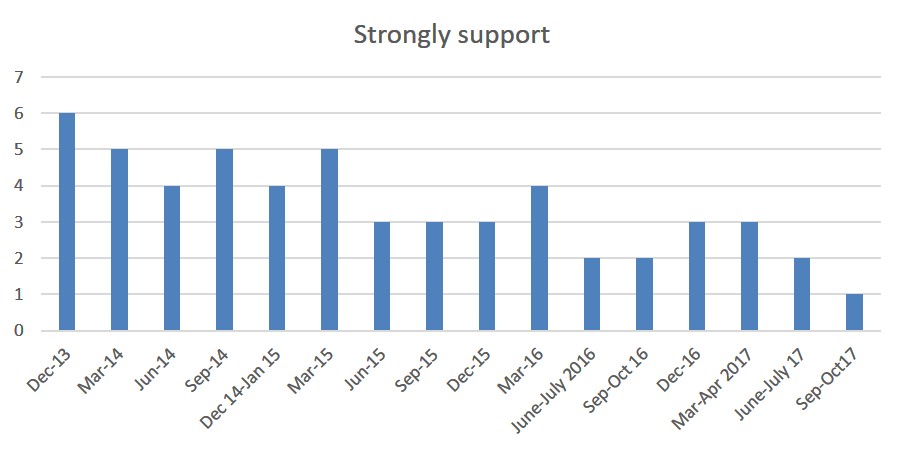
Strong opposition is up one percentage point to 14%.
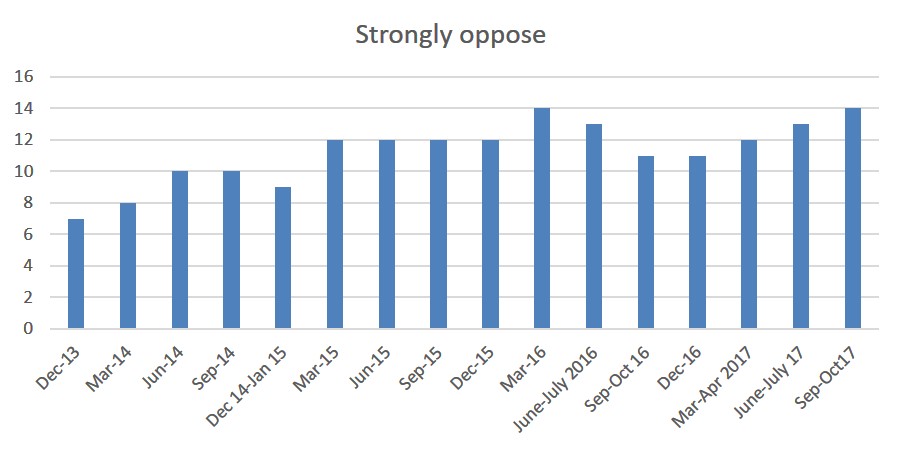
Participants who said they neither supported nor opposed fracking remained the largest proportion of the survey and unchanged at 48% since this time last year..
Awareness
Awareness of fracking was 78%, the same as the figure in the previous survey. Participants who said they knew a lot was 13%, again matching the summer survey. Participants who said they had never heard of fracking or shale gas was 22%, unchanged on the previous survey.
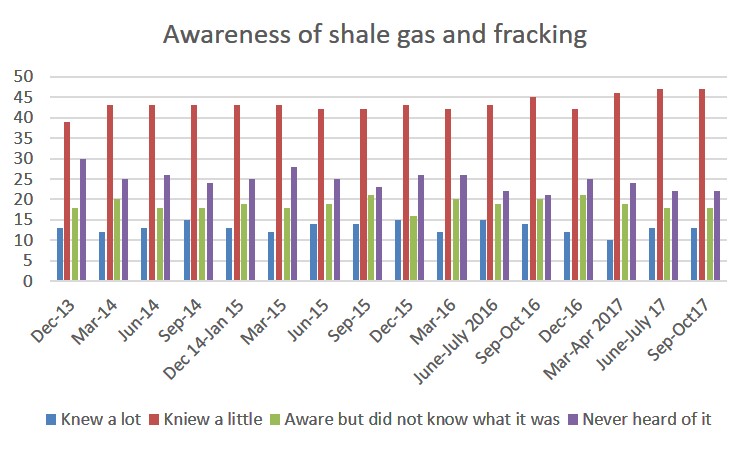
The survey concluded awareness of fracking was higher among males (84%), for those in social grade AB (91%), aged over 65 (90%), with incomes over £50,000 (91%), and home owners (86%).
Reasons
The most frequently given reasons for supporting fracking were: the need to
use all available energy sources (32%), being good for local jobs and investment (28%), potentially resulting in cheaper energy bills (26%), and to reduce dependence on other countries for the UK’s energy supply (24%)
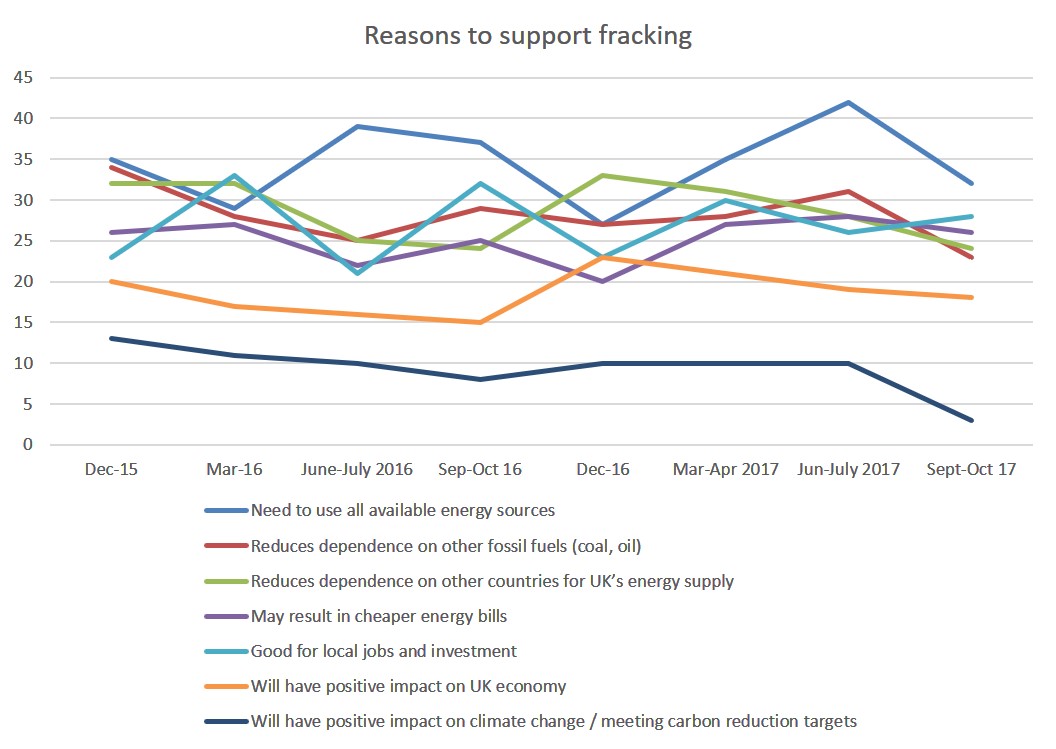
The most frequently given reason for opposing fracking was the loss or destruction of the natural environment (64%). Other frequent reasons were too much risk and uncertainty (30%), the risk of contamination to water supplies (28%), that it is
generally not a safe process (25%), and that there is a risk of earthquakes (23%).
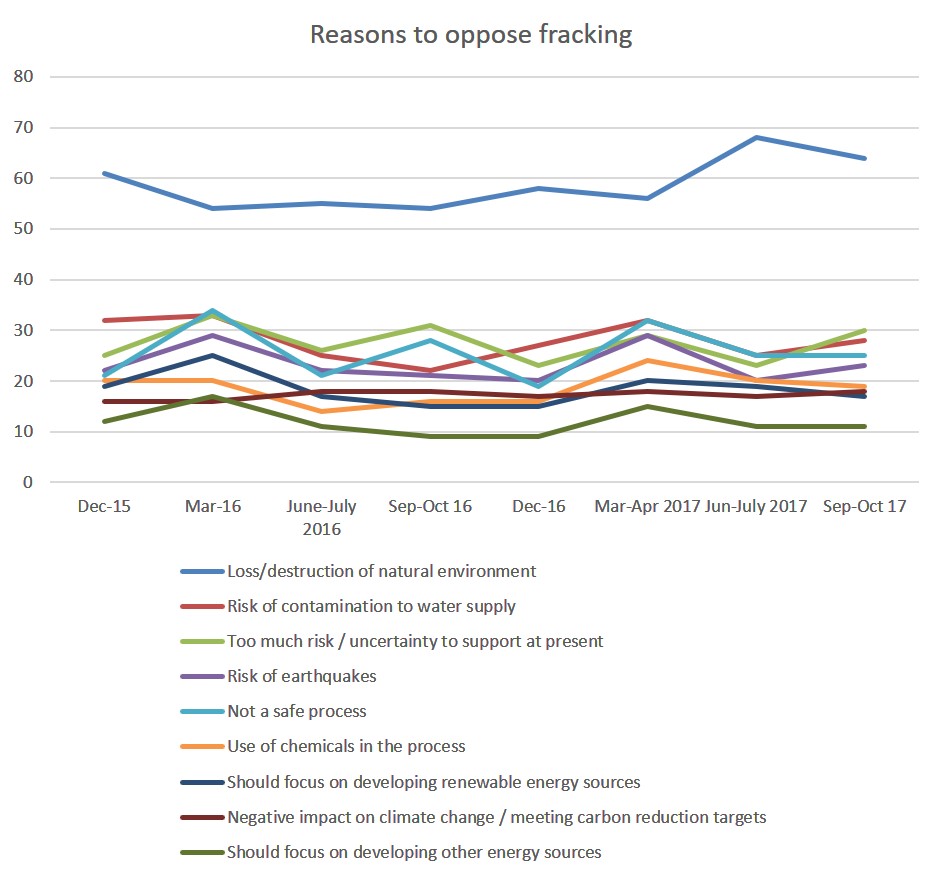
Methodology
The Wave 23 survey for the Department of Business, Energy and Industrial Strategy carried out 2,105 face-to-face interviews in homes among a representative sample of UK adults, aged 16+. The interviews were conducted between 27 September 2017 to 1 October 2017 on the Kantar TNS Omnibus, which uses a random location quota sampling method. The questionnaire was designed by BEIS and Kantar Public drawing on a number of questions from previous surveys.
Link
Wave 23, the latest BEIS quarterly public attitudes survey
Categories: Research

Not something we did not know all ready of course, it’s wake up time for the anti anti’s, time to leave the sinking ship. Leave the deck chairs where they are.
Is that a fat lady clearing her throat that I can hear?
Yet our Government still wants to take us down this irreversible path.
The “couldn’t care less” stays the same-around 50%. Interesting that it does. I suspect that represents people who will wait to see whether there is an impact to their lives. The antis will only see one impact. the pros will see another. The “couldn’t care less” will wait and see the actual proof. Pretty normal. Hence Ineos announcing new investment.
On what basis are you equating “Neither support nor oppose” and “Don’t know” with “Couldn’t care less” Martin?
Martin,
Is your entire defence “some cannot care less?” is that a rational defence? How do you know that? Have you asked every one of them?
The question that springs to mind is,
“Should they care less?”
And, if they knew of the proposals and the dangers of fracking, had that been publicised and disseminated to everyone, the way it should have been,
“Would they care less?”
The inevitable conclusion is if they had they been properly informed,
“How much would they care?”
And we all know the answer to that don’t we?
[Comment corrected at poster’s request]
Martyn the undecided does not equal “couldn’t care less” and that number is 48%, is gradually reducing and this before the industry has got going. I can’t imagine the majority will remain undecided if they get a proper look at fracking and appreciate the scale it needs to operate at. With dangerous air pollution at record levels the public is becoming increasingly aware of the impacts caused by fossil fuels and the support for investment in clean energy is increasing. There is no comfort here for the fracking industry nor the government, the message couldn’t be clearer.
This is simply a report card on the effectiveness of a dishonest fearmongering campaign. Yawn.
Oh Peeny you are not resurrecting that ID are you?
Just in case he denies it – https://environmentalistsfordondiego.wordpress.com/author/hballpeenyahoocom/ 😂
Honesty Peeny your attempts to make it look like lots of people share your weird worldview by posting under so many different IDs is REALLY sad.
Actually Peeny this is quite interesting – you post from Washington and Baltimore on local UK newspapers and here about fracking and you set up your own website / campaign about a now failed marine phosphate mine in Mexico. You even used your Bard Welsh ID to comment on the Don Diego Facebook page, so that’s exactly the same multiple ID technique you use here.
What are we to deduce from this? Are you a hired gun working for whatever mining interest pays you for your time, or are you just doing your best to pump stock in which you are invested? Or maybe you are just altruistically supporting these enterprises. OK that last suggestion was a joke.
I wonder if your Bohara16 supporters over on Hot Copper know what you get up to?
You’ve gone strangely quiet Peeny
It would be interesting to know the locations of the respondents. I suspect that those who have never heard of it will generally live a long way from the threatened areas, and they will also probably have no view either way. It would also be good to know where those who support it live, where I suspect that the majority again probably live a long way from the threatened areas. I suggest that a survey of those who live in the threatened areas, would show a far greater knowledge and hence opposition. I further suggest that security of food and clean air and water be added to the ‘security of supply’ equation. Our dependence on imported foodstuffs was approaching 50% the last time I checked and yet I don’t see any government concerns on this and hence no action to address it. Perhaps time to grow more crops on our farmland in preference to laying more concrete.
Malcolm, could not agree more. We cannot afford to give up important agricultural land to speculators, if our population growth figures recently released are anything to go by. If they do frack on agricultural land used for dairy farming will the supermarkets have to advertise the milk as coming from a herd raised on polluted grazing land?
Excellent points Malcolm and Save Lancs, that really does bear thinking about, one wonders if the FSA, the Food Standards Agency, have any recognition or understanding of the potential food labelling implications of fracking and its associated practices?
On the basis refracktion that I have spoken to quite a number people who fit that category and that is the response. They have all supplied legitimate reasons for that, which I will not bore you with, and with developments that might change that stance going forward. If you feel more comfortable with “sitting on the fence”, fine.
Meanwhile, there is an issue where some in the population are increasingly against, and some for-perhaps not so energetically. A large group still sits outside of either of those categories and is not changing. I know many find it quite difficult to move away from what they want to see, but if you have conducted such “research” that is the last thing you should do. Then, you end up with a comfort blanket but a waste of money spent conducting the study.
[Comment removed by moderator]
Will be interesting to see the polls stats when fracking has started and the world doesn’t end! Not entirely sure which demographic the poll is targeting, age? postcode? etc. Take it all with a pinch of salt for time being 🙂
It will indeed Peeny – single digit % support here we come!
As regards the sampling I’ll do your homework for you again 🙄
“Face-to-face in-home interviews were conducted with a representative sample of UK adults aged 16+. Data was collected using the TNS UK omnibus, which uses a random location quota sampling method. The questionnaire was designed by BEIS and Kantar Public drawing on a number of questions from previous surveys. Questions were refined though cognitive testing.
The representativeness of the data was controlled through sample design, fieldwork quotas and post-fieldwork weighting. Data were weighted for the following characteristics: sex, age, social grade, region and tenure. Results included here are based on weighted data.”
In terms of sample size, the sample of 2,105 out of an adult population of 63.2 million is big enough to give a 95% confidence level with a confidence interval +/- 2% – that is far higher than most commercial market research which normally uses a 95% confidence level with a +/- 5% confidence interval.
This means we can say with an extremely high degree of confidence that between 34% and 38% oppose fracking and between 11% and 15% support it.
If you really do like salt with your sour grapes though, you should of course feel free to add it.
I know this must sting Peeny, but suck it up. It’s not going to get any better for you and your fellow investors.
I believe you’re the one that is in the losing side Hobbit, you’re about to have a hefty injunction set it stone awarded against you plus TE is about to get the go ahead to begin their frack, I can assure you if they strike gas your challenge will have become almost impossible to tackle with the small numbers the antis actually have.
It would appear that Ineos do not like anyone looking at the legal papers that their injunction is based upon?
https://www.theguardian.com/environment/2017/oct/10/ineos-discloses-document-used-to-gain-injunction-on-fracking-protests
Now what does that tell us? Something to hide perhaps?
Peeny – you seem very confident of the outcome – maybe it won’t be as cut and dried as you imagine?
You clearly have no idea how many anti-fracking groups there are in the UK but then you are 4000 miles away I suppose.
How are your AJ Lucas shares doing?
KatT-not yet the desperate times, when clear facts have to be trashed! Those “sitting on the fence” is not reducing. June 2014 it was 47%. The figure has been bubbling along just under the 50% for years and is not showing any indication of sustained movement in either direction.
The “investor” card is equally silly. Perhaps the antis are all wind turbine salesmen upset their targets will be missed and their bonuses will be reduced if fracking in UK is a success?
I know speculation and fake news are popular, but not likely to change much-certainly not the fence sitters, it seems.
Pro frackers getting more and more desperate to try and explain why they are losing public support. It is simple. Once people realise what fracking entails, and the risks it poses, the more they are opposed. I suggest the pro frackers come and listen to the people who live close to proposed fracking sites and hear what they have to say. I can assure them that opposition is growing daily in these localities. As Mr Ruskell said in the Scottish parliament “fracking is the toxic fag end of the fossil fuel era”. Not wanted and not needed.